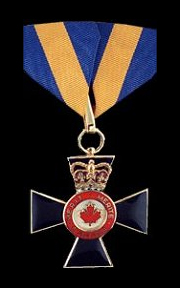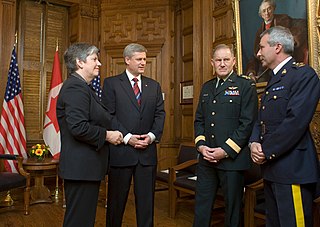Notes and references
Notes
- ↑ "William Elliott sworn in as RCMP commissioner". CBC News. 2007-07-16. Retrieved 2008-07-30.
...the organization's first chief not to have served on a police force.
. Editor's note: according to the Dictionary of Canadian Biography, Lawrence Herchmer had not served in the police at the time of his appointment as 5th commissioner of the NWMP, but in the British Army (Horrall, S. W. (1998). "Herchmer, Lawrence William". In Cook, Ramsay; Hamelin, Jean (eds.). Dictionary of Canadian Biography . Vol. XIV (1911–1920) (online ed.). University of Toronto Press.). - ↑ Andrew Mayada (2007-12-15). "RCMP commissioner promises sweeping changes". CanWest News Service. Archived from the original on 2007-12-17. Retrieved 2008-07-30.
Elliott was appointed the first civilian commissioner in the RCMP's history
- ↑ "New RCMP boss vows to rise above lack of police experience". CBC News. July 6, 2007. Retrieved 2007-07-13.
- ↑ "RCMP commissioner stepping down in summer". CBC News. February 4, 2011. Retrieved 2011-02-04.
- ↑ "PM announces the appointment of the next Commissioner of the RCMP". Government of Canada. 16 November 2011.
- ↑ Leblanc, Daniel (8 December 2011). "Paulson takes command of RCMP, pledging focus on 'core business'". The Globe and Mail Inc.
- ↑ "Front-line RCMP officers to get high-powered guns". The Globe and Mail. 21 October 2011.
- ↑ Freeze, Colin (2010-09-09). "Civilian RCMP commissioner carried a gun in Afghanistan". The Globe and Mail. Retrieved 2021-10-28.
Related Research Articles

The Royal Canadian Mounted Police is the national police service of Canada. The RCMP is an agency of the Government of Canada; it also provides police services under contract to 11 provinces and territories, over 150 municipalities, and 600 Indigenous communities. The RCMP is commonly known as the Mounties in English.

The Canadian Security Intelligence Service is a foreign intelligence service and security agency of the federal government of Canada. It is responsible for gathering, processing, and analyzing national security information from around the world and conducting covert action within Canada and abroad. CSIS reports to the Minister of Public Safety, and is subject to review by the National Security and Intelligence Review Agency.

Irwin Cotler is a retired Canadian politician who was Member of Parliament for Mount Royal from 1999 to 2015. He served as the Minister of Justice and Attorney General of Canada from 2003 until the Liberal government of Paul Martin lost power following the 2006 federal election. He was first elected to the House of Commons of Canada in a by-election in November 1999, winning 92% of votes cast.

Ralph Edward Goodale is a Canadian diplomat and retired politician who has served as the Canadian High Commissioner to the United Kingdom since April 19, 2021.
A cabinet secretary is usually a senior official who provides services and advice to a cabinet of ministers as part of the Cabinet Office. In many countries, the position can have considerably wider functions and powers, including general responsibility for the entire civil service.

The commissioner of the Royal Canadian Mounted Police is the professional head of the Royal Canadian Mounted Police (RCMP). The commissioner exercises control and management of the RCMP under the direction of the minister of public safety. The position is a Governor in Council appointment made on the advice of the prime minister of Canada.

Giuliano Zaccardelli is an Italian-born Canadian retired police officer who served as the 20th commissioner of the Royal Canadian Mounted Police (RCMP) from 2000 to 2006. His departure from the RCMP was linked to the force's involvement in the Maher Arar affair. Zaccardelli was later impugned during inquiries into irregularities in the management of the RCMP's pension and insurance fund. He subsequently became a senior official with Interpol in Lyon, France, heading its OASIS Africa program, which aims to help African police forces more effectively combat international crime.
Veterans Affairs Canada is the department within the Government of Canada with responsibility for pensions, benefits and services for war veterans, retired and still-serving members of the Canadian Armed Forces and Royal Canadian Mounted Police (RCMP), their families, as well as some civilians.

Lawrence William Herchmer was a Canadian and British police commander and army officer, who was also employed as a farmer, brewer and civil servant. He served as the fifth Commissioner of the North-West Mounted Police, from April 1, 1886 to July 31, 1900.

William Leonard Higgitt was the 14th commissioner of the Royal Canadian Mounted Police (RCMP), holding office from 1969 to 1973, and President of the International Criminal Police Organization (Interpol) from 1972 to 1976. Leonard Higgitt's background in intelligence and counterintelligence with the RCMP during and after World War II made him the preferred choice as RCMP Commissioner at what was the height of the Cold War. Higgitt's tenure as Canada's top spy, first, and then as RCMP Commissioner, also coincided with the civil rights movement in the United States, which was part of a period of broader political unrest and social change in Canada, including the Quebec nationalist movement and first-ever diplomatic negotiations in Stockholm between Canada and Communist China. Higgitt's time as Commissioner was marked by his efforts to balance a traditional view of the Mounties in the eye of the public, and a trust in the RCMP attending that view, with more modern, high-tech, and legally complex policing methods, including surveillance and data-gathering practices that found the RCMP facing increasing media and judicial scrutiny.
A police commissioner is the head of a police department, responsible for overseeing its operations and ensuring the effective enforcement of laws and maintenance of public order. They develop and implement policies, manage budgets, and coordinate with other law enforcement agencies and community groups. Additionally, the commissioner handles high-profile cases, addresses public concerns, and represents the department in various forums.

The Order of Merit of the Police Forces is an honour for merit that is, within the Canadian system of honours, the only such fellowship reserved for only members of Canada's various police forces. Created in 2000, the order is administered by the Governor in Council, on behalf of the Canadian monarch. Appointment to the order recognizes conspicuous merit and exceptional service, the level of which is reflected by the organization's three hierarchical grades.
Beverley Ann Busson is a Canadian Senator and former police officer who served as the 21st commissioner of the Royal Canadian Mounted Police (RCMP) from December 2006 to June 2007. She was the first woman to hold this position and was appointed on an interim basis in the wake of Giuliano Zaccardelli's resignation amid controversy. Busson's subsequent appointment as a member of the Senate of Canada representing British Columbia was announced on September 24, 2018.

Richard Brian Marcel Fadden is a Canadian former civil servant who was the national security advisor to the prime minister of Canada and an associate secretary to the cabinet. He retired from that position on March 31, 2016. He had previously served as the deputy minister for the Department of National Defence from 2013 to 2015. From 2009 to 2013, he was the director of the Canadian Security Intelligence Service (CSIS). He was previously the deputy minister for Citizenship and Immigration Canada from 2006 to 2009.
An inspector-general of police is a senior police officer in the police force or police service of several nations. The rank usually refers to the head of a large regional command within a police service, and in many countries refers to the most senior officer of the entire national police.

Marco Mendicino is a Canadian politician who has been the Member of Parliament for Eglinton—Lawrence in the House of Commons since 2015. He served as the Minister of Immigration, Refugees and Citizenship from 2019 to 2021 and the Minister of Public Safety from 2021 to 2023.

Stephen Lo Wai-chung is a Hong Kong retired law enforcement administrator. Lo joined the Hong Kong Police Force in 1984 after his graduation from the University of Hong Kong with a bachelor of social science in management. He served as the Commissioner of Police of Hong Kong from 2015 to 2019, Deputy Commissioner of Police (Management) from 2014 to 2015, Deputy Commissioner of Police (Operations) from 2013 to 2014, and Senior Assistant Commissioner of Police from 2011 to 2013.

Subodh Kumar Jaiswal is an Indian police officer who served as the director of Central Bureau of Investigation (CBI). He is a 1985 batch Indian Police Service (IPS) officer and former Director General of Police, Maharashtra. He was previously the police commissioner of Mumbai, the largest city in India and the seventh most populous city in the world. Jaiswal was with the Research and Analysis Wing (R&AW), India's external intelligence agency for nine years, during which he served as the additional secretary of R&AW for three years. Jaiswal has also served in Intelligence Bureau and Maharashtra ATS Chief. He was the head of the Central Industrial Security Force. Jaiswal's career began in 1985 as a trainee officer in Aurangabad, where he was subsequently assigned the full posting as the Assistant Commissioner of Police.
Russell Mirasty is the 23rd and current lieutenant governor of Saskatchewan. He was appointed by Governor General Julie Payette, on the constitutional advice of the prime minister of Canada, Justin Trudeau, on July 17, 2019. Mirasty was sworn in on July 18, filling the vacancy in the position left when W. Thomas Molloy died in office on July 2.

Raf Souccar is a Canadian former deputy police commissioner who lead the anti-drugs work of the Royal Canadian Mounted Police. After leaving the police force, Souccar launched and led a medical cannabis company.
References
- Prime Minister's Office (2005). News Release: Prime Minister announces the appointment of his National Security Advisor. Retrieved July 8, 2005.
- Transport Canada (2000). "The New Assistant Deputy Minister – Safety and Security", Newsletter Fall 2000. Retrieved July 8, 2005.
- Prime Minister's Office (2006). News Release: Prime Minister announces changes in the senior ranks of the Public Service. Retrieved April 29, 2006.